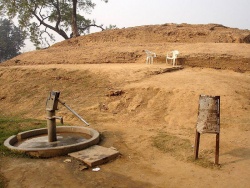Pava
Pava (now Fazilnagar) is a city in ancient India, at the time of Gautama Buddha. It was a city of the Mallas which the Buddha visited during his last journey, going there from Bhogagama and staying at Cunda's mango grove. Pava is located about 15 kilometres east of Kushinagar in Uttar Pradesh, India.
Cunda lived in Pava and invited the Buddha to a meal, which proved to be his last. It was on this occasion that the Cunda Sutta was preached. From Pava the Buddha journeyed on to Kushinagar, crossing the Kakkuttha River on the way
According to the Sangiti Sutta, at the time the Buddha was staying at Pava, the Mallas had just completed their new Mote hall, Ubbhataka, and, at their invitation, the Buddha consecrated it by first occupying it and then preaching in it. After the Buddha had finished speaking, Sariputta recited the Sangiti Sutta to the assembled monks.
Pava was also a centre of Jainism and, at the time mentioned above, Mahavira had just died at Pava and his followers were divided by bitter wrangles. Cunda Samanuddesa was spending his rainy season at Pava, and he reported to the Buddha, who was at Samagama, news of the Nirgranthas’ quarrels.
After the Buddha's death, the Mallas of Pava claimed a share in his relics. The Brahmin Dona satisfied their claim, and a Stupa was erected in Pava over their share of the relics.
